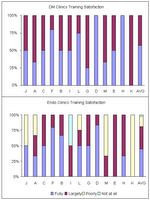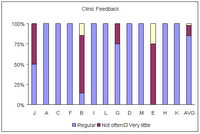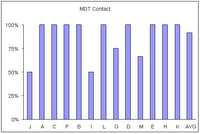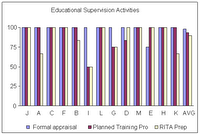Report of Training Posts Survey 2006
Dr Shaz Wahid
Training Programme Director
INTRODUCTION
With the introduction of a new RITA process and following PMETB guidance our training programme needed to develop a quality assurance programme, hence this survey. The specialist Training Committee developed a questionnaire (appendix A) that covered the following areas:
General & Specialist Diabetes & Endocrinology
GIM-acute and non-acute
Generic Professional Activities
Professional activity support essentials
Study leave
Educational supervision
This questionnaire was circulated in October 2005 and the results were collated by the TPD alone in April 2006 to maintain anonymity of the SpRs. All 23 SpRs with NTNs at the time completed at least 1 questionnaire and a total of 47 questionnaires in relation to 13 training units were analysed. Each training unit had a minimum of 2 questionnaires completed (Table 1).
Table 1-number of questionnaires analysed for each training unit.
A: 3
B: 6
C: 2
D: 6
E: 4
F: 5
G: 4
H: 3
I: 2
J: 2
K: 3
L: 4
M: 3
When presenting the data each unit has been represented by a random alphabetical code. The mean for the region is included allowing each individual unit to make comparisons. However, given the small numbers such comparisons should be with caution. Also, the results do not take into account any improvements in training that may have developed in an individual unit over the years. Only a repeat of the survey in 3-years will improve the validity of the results for individual training units.
I would urge individual units to tackle any training deficiencies identified by this survey.
Shaz Wahid.
July 2006.
GENERAL DIABETES & ENDOCRINOLOGY
SpRs were asked to document the number of general clinics they attended (Figure 1), whether these clinics met their individual training needs (Figure 2). SpRs were asked whether they received feedback during or after clinics (Figure 3) and whether they had enough MDT exposure (Figure 4).
 Figure 1-Number of general specialty clinics attended per week.
Figure 1-Number of general specialty clinics attended per week. Figure 2-Did the clinics meet your individual training requirements.
Figure 2-Did the clinics meet your individual training requirements. Figure 3-How often was feedback provided in clinics.
Figure 3-How often was feedback provided in clinics. Figure 4-MDT exposure during attachment
Figure 4-MDT exposure during attachmentCORE SPECIALIST CLINICS EXPERIENCE
SpRs were asked to document their individual core specialist clinic training needs during their stay with each unit and whether these needs were met. Diabetes (Figure 5), Endocrinology (Figure 7) and community diabetes (Figure 6) were separated.
 Figure 5-Were training needs in the core specialist diabetes clinics met?
Figure 5-Were training needs in the core specialist diabetes clinics met? Figure 6-Was enough exposure to community diabetes provided?
Figure 6-Was enough exposure to community diabetes provided? Figure 7- Were training needs in the core specialist endocrine clinics met?
Figure 7- Were training needs in the core specialist endocrine clinics met?GENERAL (INTERNAL) MEDICINE
SpRs were asked questions on out-patient G(I)M clinic experience (Figures 8 and 9) as well as in-patient experience and support for both the acute (Figure 10) and ambulatory (Figures 11 and 12) aspects of care. Please note the results of the specific question “did GIM interfere with your specialty training” in figure 12.
 Figure 8-Number of weekly G(I)M clinics.
Figure 8-Number of weekly G(I)M clinics. Figure 9-Did the G(I)M clinics meet your training requirements?
Figure 9-Did the G(I)M clinics meet your training requirements? Figure 10-Acute Medicine exposure in relation to on-call satisfaction, ward rounds, CCU and ITU
Figure 10-Acute Medicine exposure in relation to on-call satisfaction, ward rounds, CCU and ITU Figure 11-Number of weekly Consultant attended and SpR led ward-rounds
Figure 11-Number of weekly Consultant attended and SpR led ward-rounds Figure 12-G(I)M in-patient work load and support (% ward cover relates to an average week and junior support relates to the question “was there adequate junior support?”)
Figure 12-G(I)M in-patient work load and support (% ward cover relates to an average week and junior support relates to the question “was there adequate junior support?”)CONTINUING PROFESSIONAL/EDUCATIONAL ACTIVITY
SpRs were asked whether they had fixed weekly CPD sessions (Figures 13, 14 and 15) and questions in relation to formal study leave (Figures 16 and 17). They were also asked about opportunities to undertake general professional activities, such as teaching, audit and internal presentations (Figure 18).
 Figure 13-Were you offered fixed weekly session(s) for CPD purposes?
Figure 13-Were you offered fixed weekly session(s) for CPD purposes? Figure 14-Number of fixed weekly CPD sessions.
Figure 14-Number of fixed weekly CPD sessions. Figure 15-Proportion of sessions actually obtained for the year.
Figure 15-Proportion of sessions actually obtained for the year. Figure 16-Annual study leave, excluding fixed weekly CPD
Figure 16-Annual study leave, excluding fixed weekly CPD Figure 17-Proportion of SpRs encountering problems attending national or international conferences, GIM ½ days, regional CME or other courses.
Figure 17-Proportion of SpRs encountering problems attending national or international conferences, GIM ½ days, regional CME or other courses. Figure 18-Teaching, audit and internal presentation activity/opportunities
Figure 18-Teaching, audit and internal presentation activity/opportunitiesCPD SUPPORT
SpRs were asked specific questions on whether they had protected time for administration (Figure 19) and whether they had appropriate office and IT facilities to support their CPD (Figure 20).
 Figure 19-Administration activity.
Figure 19-Administration activity. Figure 20-Office and IT support.
Figure 20-Office and IT support.EDUCATIONAL SUPERVISION
SpRs were asked how often they had meetings with their educational supervisor (Figure 21) and whether they were formally appraised, received a formal training programme and were prepared for their RITA by their educational supervisor (Figure 22).
 Figure 21-Mean number of meetings with educational supervisor.
Figure 21-Mean number of meetings with educational supervisor. Figure 22-Educational supervision effectiveness/activities.
Figure 22-Educational supervision effectiveness/activities.SpR Training Post Feedback Form (APPENDIX A)
Post_______Dates in Post___________ Year of training during this post________
Average number of general clinics attended per week for
-Diabetes___ did this number meet your training needs (circle/delete) Fully Largely Poorly Not at all
-Endocrinology__ did this number meet your training needs (circle/delete) Fully Largely Poorly Not at all
-GIM__ did this number meet your training needs (circle/delete) Fully Largely Poorly Not at all
Was feedback/case discussion provided during or shortly after clinic (circle/delete) Regularly not enough very little None Comments:_______________________________________________________
Was enough contact with the Multi-Disciplinary-Team either during clinics or the course of the week experienced (circle/delete) YES NO comments:__________________________________________________
On-call frequency and rota type_______________ was this satisfactory/unsatisfactory (delete)
Did you regularly attend the post-take ward round (circle/delete) YES NO comments:_____________________
Did you gain enough CCU experience (circle/delete) YES NO comments:_______________________________
Did you gain enough ITU/HDU experience (circle/delete) YES NO comments:___________________________
What percentage of your workload for the average week entailed base ward cover ____
Number of Consultant ward-rounds attended per week__ Number of SpR lead ward rounds per week__
Was their adequate junior support (circle/delete) YES NO comments:___________________________________
Did the GIM work-load significantly interfere with your specialist training (circle/delete) YES NO Coments:_____________________________________________________
Circle/Delete which specialist clinics you attended Diabetes Eye/Medical retinal Adolescent Diabetes Diabetes Foot Paediatric Diabetes Lipid Obstetric/Medicine Diabetes Antenatal Diabetes Renal Paediatric Endocrinology Reproductive Endocrinology Joint Pituitary Bone
Was enough experience in community diabetes provided (circle/delete) YES NO comments:___________________
Were your specialist clinic experience needs in diabetes met (circle/delete) Fully Largely Poorly Not at all What were they for this post______________________________________________________
Were your specialist clinic experience needs in endocrinology met (circle/delete) Fully Largely Poorly Not at all What were they for this post_____________________________________________________________
Was there protected time during the week for CPD purposes (circle/delete) YES NO if yes, number of sessions__ ; what % did you actually manage to take _____%
Was there protected time during the week for admin (circle/delete) YES NO number of sessions__
Number of Study Days taken ___ ; Did you have problems in obtaining enough study leave for
-National conferences (circle/delete) YES NO
-International conferences (circle/delete) YES NO
-Regional specialist training CME events, e.g. NEDS, NERRAG, NORDAG (circle/delete) YES NO
-Regional GIM SpR ½ days (circle/delete) YES NO
-Specific courses to meet training requirements, eg ALS (circle/delete) YES NO
Were you provided with adequate IT support/computer access (circle/delete) YES NO
Were you provided with your own office/desk space (circle/delete) YES NO
Did you have enough opportunities to
-Teach (circle/delete) YES NO
-Present at internal meetings (circle/delete) YES NO
-Undertake an audit (circle/delete) YES NO
Educational Supervision: how often did you meet___________; was time set aside for formal appraisal____; was a planned training programme agreed at the start of the post_____; were you prepared for your RITA____ comments:__________________________________________________________
Please detail any other comments related to your training requirements during this post: